2013年普通高等学校招生全国统一考试(江苏卷)英语试题word版精校
- 格式:doc
- 大小:639.00 KB
- 文档页数:12
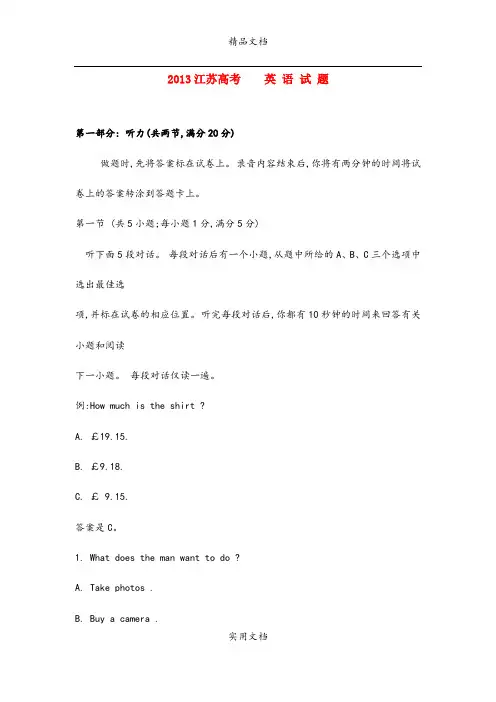
2013江苏高考英语试题第一部分: 听力(共两节,满分20分)做题时,先将答案标在试卷上。
录音内容结束后,你将有两分钟的时间将试卷上的答案转涂到答题卡上。
第一节 (共5小题;每小题1分,满分5分)听下面5段对话。
每段对话后有一个小题,从题中所给的A、B、C三个选项中选出最佳选项,并标在试卷的相应位置。
听完每段对话后,你都有10秒钟的时间来回答有关小题和阅读下一小题。
每段对话仅读一遍。
例:How much is the shirt ?A. £19.15.B. £9.18.C. £ 9.15.答案是C。
1. What does the man want to do ?A. Take photos .B. Buy a camera .C. Help the woman.2. What are the speakers talking about ?A. A noisy night .B. Their life in town .C. A place of living.3. Where is the man now ?A. On his way.B. In a restaurant .C. At home.4. What will Celia do ?A. Find a player .B. Watch a game.C. Play basketball .5. What day is it when the conversation takes place?A. Saturday.B. Sunday.C. Monday.第二节 (共15小题;每小题1分,满分15分)听下面5段对话或独白。
每段对话或独白后有几个小题,从题中所给的A、B、C 三个选项中选出最佳选项,并标在试卷的相应位置。
听每段对话或独白前,你将有时间阅读各个小题,每小题5秒钟;听完后,各小题将给出5秒钟的作答时间。
每段对话或独白读两遍。
![[DOC]-2013年江苏高考英语试卷及答案](https://uimg.taocdn.com/761e1b7d10a6f524cdbf855c.webp)
[DOC]-2013年江苏高考英语试卷及答案2013年江苏高考英语试卷及答案2013年全国高考英语试题(江苏卷)及答案第二部分: 英语知识运用(共两节, 满分35 分)第一节: 单项填空 (共15小题; 每小题1分,满分15分)21. Gnerally, students’ inner motivation with high expectationsfrom others _____ essential to their development. A. is B. are C. was D. were22. —The T-shirt I received is not the same as is shown online.—_____? But I promise you we’ll look into it right away.A. Who saysB. How comeC. What forD. Why worry23. —The town is so beautiful! I just love it.—Me too. The character of the town is well _____.A. qualitfiedB. preservedC. decoratedD. simplified24. Lionel Messi, _____ the record for the most goals in a calendar year, is considered the most talented football player in Europe.A. setB. settingC. to setD. having set25. —Could I use your car tomorrow morning? —Sure, I _____ areport at home.A. will be writingB. will have writtenC. have writtenD. have been writing26. I am always delighted when I recieve an e-mail from you. _____ the party on July 1st, I shall be pleased to attend.A. On account of B. In response to C. In view of D.With regard to27. “Never for a second,” the boy says, “_____ that my father would come to my rescue.”A. I doubtedB. do I doubtC. I have doubtedD. did I doubt28. In the global economy, a new drug for cancer, _____ it is discovered, will create many economic possibilities around the world.A. whateverB. whoever C.wherever D.whichever29. Team leaders must ensure that all members _____ their natural desire to avoid the embarrasment associated with making mistakes.A. get overB. look overC. take overD. come over30. I should not have laughed if I _____ you were serious.A. thoughtB. would thinkC. had thoughtD. have thought31. Shortly after suffering from a massive earthquake and _____ to ruins, the city took on a new look. A. reducing B. reduced C. being reduced D. having reduced32. The president of teh World Bank says he has a pssion for China, _____ he remembers starting as early as his childhood.A. whereB. whichC. whatD. when33. With inspiration from other food cultures, American food culture can take a _____ for the better. A. share B. chance C. turn D. when34. —What about your self-drive trip yesterday?—Tiring! The road is being widened, and we _____ a round ride.A. hadB. haveC. would haveD. have had35. —Thank you for the flowers. —_____. I thought they mightcheer you up.A. That’s rightB. All rightC. I’m all rightD. It’s all right第二节: 完形填空(共20小题; 每小题1 分, 满分20 分)I used to believe in the American Dream, which meant a job, a mortgage (按揭), creditcards, success. I wanted it and worked toward it like everyone else, all of us chasing the same thing.One year, through a series of unhappy events, it all fell . I found myself homeless and alone. I had my truck and $56. I teh countryside for some place I could rent for the possible amount. I came upon a shabby house four miles up a winding mountain road the Potomac River in West Virginia. It was , full of broken glass and rubbish. I found the owner, rented it, and a corner to camp in.The locals knew nothing about me, slowly, they started teaching me the of being a neighbor. They dropped off blankets, candles, and tools, and began around to chat. They started to teach me a belief in a American Dream—not the one of individual achievementbut of .What I have believed in, all those things I thought were for a civilized life, were nonexistent in this place. on teh mountain, my most valuable possessions were my with my neighbors.Four years later, I moved back into . I saw many people were having a really hard time, their jobs and homes. I managed to reant a big enough house to a handful of people. There are four of us now in the house, but over time I’ve had nine people come in and move on to other places. We’d all be in if we hadn’t banded together.The American Dream I believe in now is a shared one. It’s not so much about what I can get for mysefl; it’s about we can all get by together.36. A. separately B. equally C. violently D. naturally37. A. off B. apart C. over D. out38. A. crossed B. left C. toured D. searched39. A. fullest B. largest C. fairest D. cheapest40. A. at B. through C. over D. round41. A. occupied B. abandoned C. emptied D. robbed42. A. turned B. approached C. cleared D. cut43. A. but B. although C. otherwise D. for44. A. benefit B. lesson C. nature D. art45. A. sticking B. looking C. swingting D. turning46. A. wild B. real C. different D. remote47. A. neighborliness B. happiness C. friendliness D. kindness48. A. unique B. expensive C. rare D. necessary49. A. Up B. Down C. Deep D. Along50. A. cooperation B. relationship C. satisfaction D. appointments51. A. reality B. society C. town D. life52. A. creating B. losing C. quitting D. offering53. A. put in B. turn in C. take in D. get in54. A. yards B. shelters C. camps D. cottages55. A. when B. what C. whehter D. how第三部分: 阅读理解(共15 小题; 每小题2 分, 满分30 分)A56. The leaflet is to inform visitors of the Park’s _____. A.advanced management B. thrill performances C. entertainmentfacilities D. thoughtful services 57. A visitor to the Park can _____. A. rent a stroller outside Front Gate B. ask for first aid by Thunder Run C. smoke in the Water Park D. leave his pet at KidZvilleBWe’ve considered several ways of paying to cut in line: hiring line standers, buying tickets fromscalpers (票贩子), or purchasing line-cutting privileges directly from, say, an airline or anamusement park. Each of these deals replaces the morals of the queue(waiting your turn) with the morals of the market (paying a price for faster service).Markets and queues—paying and waiting—are two different waysof allocating things, and each is appropriate to differentactivities. The morals of the queue, “First come, first served,” have an egalitarian (平等主义的) appeal. They tell us to ignore privilege, power, and deep pockets.The principle seems right on playgrounds and at bus stops. But the morals of thequeue do not govern all occasions. If I put my house up for sale, I have no duty toaccept the first offer that comes along, simply because it’s the first. Selling myhouse and waiting for a bus are different activities, properly governed by different standards.Sometimes standards change, and it is unclear which principle should apply. Think of the recorded message you hear, played over and over, as you wait on hold when calling your bank: “Your call will be answered in the order in which it was received.” This is essential for the moralsof the queue. It’s as if the company istrying to ease our impatience with fairness.But don’t take the recorded message too seriously. Today, some people’s calls are answered faster than others. Call center technology enables companies to “score” incoming calls and togive faster service to those that come from rich places. You might call this telephonic queue jumping.Of course, markets and queues are not the only ways of allocating things. Some goods we distribute by merit, others by need, still others by chance. However, the tendency of markets to replace queues, and other non-market ways of allocating goods is so common in modern life that we scarcely notice it anymore. It is striking that most of the paid queue-jumping schemes we’veconsidered — at airports and amusement parks, in call centers, doctors’ offices, and national parks — are recent developments, scarcely imaginable three decades ago. The disappearance of the queues in these places may seem an unusual concern, but these are not the only places that markets have entered.58. According to the author, which of the following seems governedby the principle “Firstcome,first served”?A. Taking buses.B. Buying houses.C. Flying with an airline.D. Visiting amusement parks.59. The example of the recorded message in Paragraphs 4 and 5 illustrates _____.A. the necessity of patience in queuingB. the advantage of modern technologyC. the uncertainty of allocation principleD. the fairness of telephonic services60. The passage is meant to _____.A. justify paying for faster servicesB. discuss the morals of allocating thingsC. analyze the reason for standing in lineD. criticize the behavior of queue jumpingCIf a diver surfaces too quickly, he may suffer the bends. Nitrogen (氮) dissolved (溶解) in his blood is suddenly liberated bythe reduction of pressure. The consequence, if the bubbles (气泡)accumulate in a joint, is sharp pain and a bent body—thus thename. If the bubbles form in his lungs or his brain, the consequence can bedeath.Other air-breathing animals also suffer this decompression (减压) sickness if they surface too fast: whales, for example. And so, long ago, did ichthyosaurs. That these ancient sea animals got the bends can beseen from their bones. If bubbles of nitrogen form inside the bone they can cut off its blood supply. This kills thecells in the bone, and consequently weakens it, sometimes to the point of collapse. Fossil (化石) bones that have caved in on themselves are thus a sign that the animal once had the bends.Bruce Rothschild of the University of Kansas knew all this when he began a study of ichthyosaur bones to find out how widespread the problem was in the past. What he particularly wanted to investigate was how ichthyosaurs adapted to the problem of decompression over the 150million years. To this end, he and his colleagues traveled the world’s natural-history museums, lookingat hundreds of ichthyosaurs from the Triassic period and from the later Jurassic and Cretaceous periods.When he started, he assumed that signs of the bends would be rarerin younger fossils, reflecting their gradual evolution of measures to deal with decompression. Instead, he was astonished to discover the opposite. More than 15% of Jurassic and Cretaceous ichthyosaurs had suffered the bends before they died, but not a single Triassic specimen (标本) showed evidence of that sort ofinjury.If ichthyosaurs did evolve an anti-decompression means, they clearly did so quickly—and, most strangely, they lost itafterwards. But that is not what Dr Rothschild thinks happened. He suspects it was evolution in other animals that caused the change.Whales that suffer the bends often do so because they have surfaced to escape apredator (捕食动物) such as a large shark. One of the features of Jurassic oceans was an abundance of large sharks and crocodiles, both of which were fond of ichthyosaur lunches. Triassic oceans, by contrast, were mercifully shark- and crocodile-free. In the Triassic, then, ichthyosaurs were top of the food chain. In the Jurassic and Cretaceous, they were prey (猎物) as well as predator—and often had to make a speedy exit as a result.61. Which of the following is a typical symptom of the bends?A. A twisted body.B. A gradual decrease in blood supply.C. A sudden release of nitrogen in blood.D. A drop in blood pressure.62. The purpose of Rothschild’s study is to see _____.A. how often ichthyosaurs caught the bendsB. how ichthyosaurs adapted to decompressionC. why ichthyosaurs bent their bodiesD. when ichthyosaurs broke their bones63. Rothschild’s finding stated in Paragraph 4 _____.A. confirmed his assumptionB. speeded up his research processC. disagreed with his assumptionD. changed his research objectives64. Rothschild might have concluded that ichthyosaurs ______.A. failed to evolve an anti-decompression meansB. gradually developed measures against the bendsC. died out because of large sharks and crocodilesD. evolved an anti-decompression means but soon lost itDMark Twain has been called the inventor of the American novel. Andhe surely deserves additional praise: the man who popularized the clever literary attack on racism.I say clever because anti-slavery fiction had been the importantpart of theliterature in the years before the Civil War. H. B.Stowe’s Uncle Tom’s Cabin is only the most famous example. These early stories dealt directly with slavery. With minor exceptions, Twain planted his attackson slavery and prejudice into tales that were on the surface about something else entirely. He drew his readers into the argument by drawing them into the story.Again and again, in the postwar years, Twain seemed forced to deal with the challenge of race. Consider the most controversial, at least today, of Twain’s novels, Adventures of Huckleberry Finn. Only a few books have been kicked off the shelves as often as Huckleberry Finn, Twains most widely read tale. Once upon a time, people hated the book because it struck them as rude. Twain himself wrote that those who banned the book considered the novel “trash and suitable onl y for the slums (贫民窟).” More recently the book has been attacked because of the character Jim, the escaped slave, and many occurences of the word nigger. (The term Nigger Jim, for which the novel is often severely criticized, never appears in it.)But the attacks were and are silly—and miss the point. Thenovel is strongly anti-slavery. Jim’s search through the slavestates for the family from whom he has been forcibly parted is heroic. As J. Chadwick has pointed out, the character of Jim was a first in American fiction—a recognition that the slave had two personalities, “the voice of survival within a white slave culture and the voice of the individual: Jim, the father and the man.”There is much more. Twain’s mystery novel Pudd’nhead Wilson stood as a challenge to the racial beliefs of even many of the liberals of his day. Written at a time when the accepted wisdom held Negroes to be inferior (低等的) to whites, especially inintelligence, Twain’s tale centered in part around two babies switched at birth. A slave gave birth to her master’s baby and, for fear that the child should be sold South, switched him for the master’s baby by his wife. The slave’s light-skinned child wastaken to be white and grew up with both the attitudes and theeducation of the slave-holding class. The master’s wife’s babywas taken for black and grew up with the attitudes and intonationsof the slave.The point was difficult to miss: nurture (养育), not nature, was the key to social status. The features of the black man thatprovided the stuff of prejudice—manner of speech, for example—were, to Twain, indicative of nothing other than the conditioning that slavery forced on its victims.Twain’s racial tone was not perfect. One is left uneasy, forexample, by the lengthy passage in his autobiography (自传) about how much he loved what were called “nigger shows” in his youth—mostly with white men performing in black-face—and his delight in getting his mother to laugh at them. Yet there is no reason to think Twain saw the shows as representing reality. His frequent attacks on slavery and prejudice suggest his keen awareness that they did not.Was Twain a racist? Asking the question in the 21st century is as wise as asking the same of Lincoln. If we read the words and attitudes o f the past through the “wisdom” of the considered moral judgments of the present, we will find nothing but error. Lincoln, who believed the black manthe inferior of the white, fought and won a war to free him. And Twain, raised in a slave state, briefly a soldier, and inventor of Jim, may have done more to anger the nation over racial injustice and awaken its collective conscience than any other novelist in the past century.65. How do Twain’s novels on slavery differ from Stowe’s?A. Twain was more willing to deal with racism.B. Twain’s attack on racism was much less open.C. Twain’s themes seemed to agree with plots.D. Twain was openly concerned with racism.66. Recent criticism of Adventures of Huckleberry Finn arose partly from its _____.A. target readers at the bottomB. anti-slavery attitudeC. rather impolite languageD. frequent use of “nigger”67. What best proves Twain’s anti-slavery stand according tothe author?A. Jim’s search for his family was described in detail.B. The slave’s voice was first heard in American novels.C. Jim grew up into a man and a father in the white culture.D. Twain suspected that the slaves were less intelligent.68. The story of two babies switched mainly indicates that _____.A. slaves were forced to give up their babies to their mastersB. slaves’ babies could pick up slave-holders’ way of speakingC. blacks’ social position was shaped by how they were brought upD. blacks were born with certain features of prejudice69. What does the underlined w ord “they” in Paragraph 7 refer to?A. The attacks.B. Slavery and prejudice.C. White men.D. The shows.70. What does the author mainly argue for?A. Twain had done more than his contemporary writers to attackracism.B. Twain was an admirable figure comparable to Abraham Lincoln.C. Twain’s works had been banned on unreasonable grounds.D. Twain’s works should be read from a historical point of view.第四部分: 任务型阅读(共10 小题;每小题1 分,满分10 分)请认真阅读下列短文,并根据所读内容在文章后表格中的空格里填入一个最恰当的单((词。
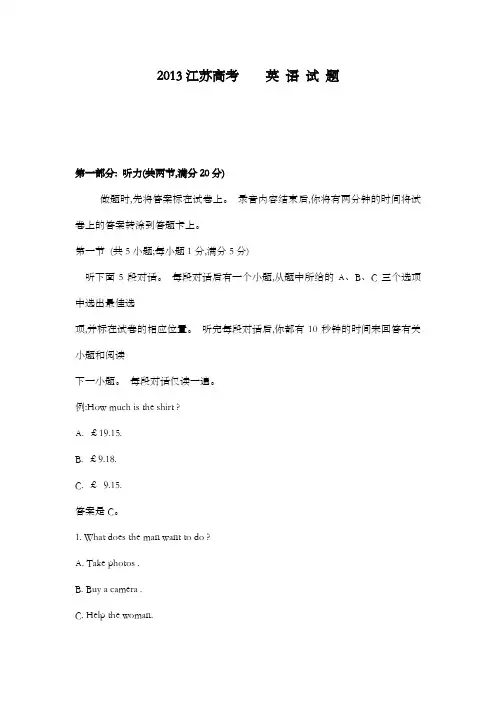
2013江苏高考英语试题第一部分: 听力(共两节,满分20分)做题时,先将答案标在试卷上。
录音内容结束后,你将有两分钟的时间将试卷上的答案转涂到答题卡上。
第一节(共5小题;每小题1分,满分5分)听下面5段对话。
每段对话后有一个小题,从题中所给的A、B、C三个选项中选出最佳选项,并标在试卷的相应位置。
听完每段对话后,你都有10秒钟的时间来回答有关小题和阅读下一小题。
每段对话仅读一遍。
例:How much is the shirt ?A. £19.15.B. £9.18.C. £9.15.答案是C。
1. What does the man want to do ?A. Take photos .B. Buy a camera .C. Help the woman.2. What are the speakers talking about ?A. A noisy night .B. Their life in town .C. A place of living.3. Where is the man now ?A. On his way.B. In a restaurant .C. At home.4. What will Celia do ?A. Find a player .B. Watch a game.C. Play basketball .5. What day is it when the conversation takes place?A. Saturday.B. Sunday.C. Monday.第二节(共15小题;每小题1分,满分15分)听下面5段对话或独白。
每段对话或独白后有几个小题,从题中所给的A、B、C 三个选项中选出最佳选项,并标在试卷的相应位置。
听每段对话或独白前,你将有时间阅读各个小题,每小题5秒钟;听完后,各小题将给出5秒钟的作答时间。
每段对话或独白读两遍。
听第6段材料,回答第6、7题。
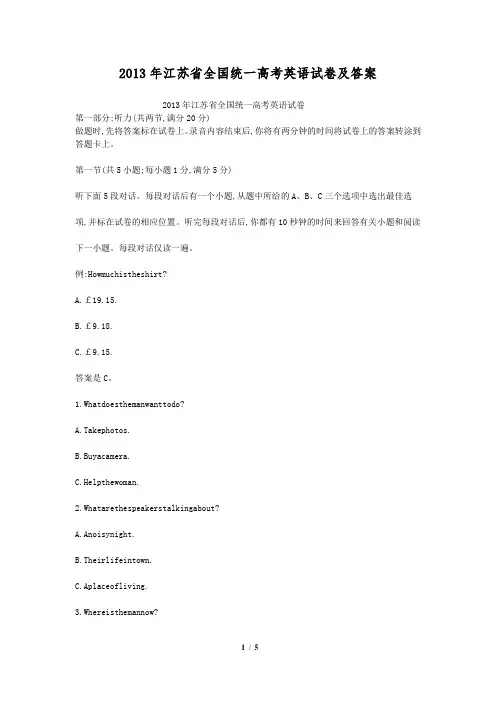
2013年江苏省全国统一高考英语试卷及答案2013年江苏省全国统一高考英语试卷第一部分:听力(共两节,满分20分)做题时,先将答案标在试卷上。
录音内容结束后,你将有两分钟的时间将试卷上的答案转涂到答题卡上。
第一节(共5小题;每小题1分,满分5分)听下面5段对话。
每段对话后有一个小题,从题中所给的A、B、C三个选项中选出最佳选项,并标在试卷的相应位置。
听完每段对话后,你都有10秒钟的时间来回答有关小题和阅读下一小题。
每段对话仅读一遍。
例:Howmuchistheshirt?A.£19.15.B.£9.18.C.£9.15.答案是C。
1.Whatdoesthemanwanttodo?A.Takephotos.B.Buyacamera.C.Helpthewoman.2.Whatarethespeakerstalkingabout?A.Anoisynight.B.Theirlifeintown.C.Aplaceofliving.3.Whereisthemannow?A.Onhisway.B.Inarestaurant.C.Athome.4.WhatwillCeliado?A.Findaplayer.B.Watchagame.C.Playbasketball.5.Whatdayisitwhentheconversationtakesplace?A.Saturday.B.Sunday.C.Monday.第二节(共15小题;每小题1分,满分15分)听下面5段对话或独白。
每段对话或独白后有几个小题,从题中所给的A、B、C三个选项中选出最佳选项,并标在试卷的相应位置。
听每段对话或独白前,你将有时间阅读各个小题,每小题5秒钟;听完后,各小题将给出5秒钟的作答时间。
每段对话或独白读两遍。
听第6段材料,回答第6、7题。
6.WhatisSaragoingtodo?A.BuyJohnagift.B.GiveJohnasurprise.C.InviteJohntoFrance.7.WhatdoesthemanthinkofSara’splan?A.Funny.B.Exciting.C.Strange.听第7段材料,回答第8、9题。
![[精品]2013年全国统一考试英语试卷江苏卷及答案](https://uimg.taocdn.com/3dc68fdf941ea76e58fa0463.webp)
2013江苏高考英语试题第一部分: 听力(共两节,满分20分)做题时,先将答案标在试卷上。
录音内容结束后,你将有两分钟的时间将试卷上的答案转涂到答题卡上。
第一节 (共5小题;每小题1分,满分5分)听下面5段对话。
每段对话后有一个小题,从题中所给的A、B、C 三个选项中选出最佳选项,并标在试卷的相应位置。
听完每段对话后,你都有10秒钟的时间来回答有关小题和阅读下一小题。
每段对话仅读一遍。
例:How much is the shirt ?A. £19.15.B. £9.18.C. £ 9.15.答案是C。
1. What does the man want to do ?A. Take photos .B. Buy a camera .C. Help the woman.2. What are the speakers talking about ?A. A noisy night .B. Their life in town .C. A place of living.3. Where is the man now ?A. On his way.B. In a restaurant .C. At home.4. What will Celia do ?A. Find a player .B. Watch a game.C. Play basketball .5. What day is it when the conversation takes place?A. Saturday.B. Sunday.C. Monday.第二节 (共15小题;每小题1分,满分15分)听下面5段对话或独白。
每段对话或独白后有几个小题,从题中所给的A、B、C三个选项中选出最佳选项,并标在试卷的相应位置。
听每段对话或独白前,你将有时间阅读各个小题,每小题5秒钟;听完后,各小题将给出5秒钟的作答时间。
每段对话或独白读两遍。
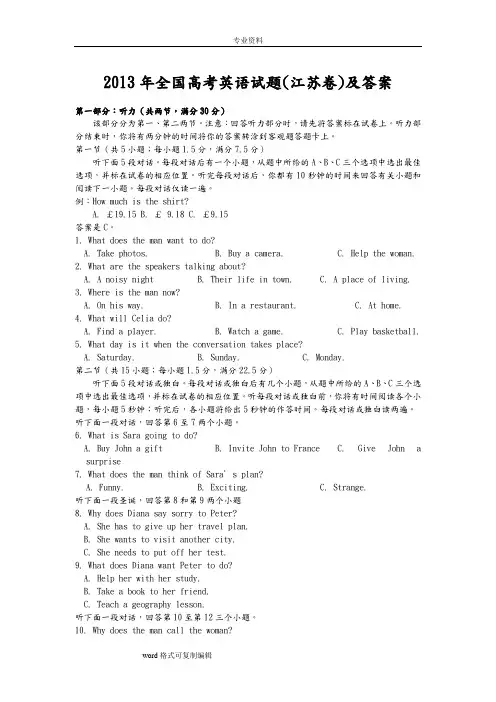
2013年全国高考英语试题(江苏卷)及答案第一部分:听力(共两节,满分30分)该部分分为第一、第二两节。
注意:回答听力部分时,请先将答案标在试卷上。
听力部分结束时,你将有两分钟的时间将你的答案转涂到客观题答题卡上。
第一节(共5小题;每小题1.5分,满分7.5分)听下面5段对话。
每段对话后有一个小题,从题中所给的A、B、C三个选项中选出最佳选项,并标在试卷的相应位置。
听完每段对话后,你都有10秒钟的时间来回答有关小题和阅读下一小题。
每段对话仅读一遍。
例:How much is the shirt?A. £19.15B. £ 9.18C. £9.15答案是C。
1. What does the man want to do?A. Take photos.B. Buy a camera.C. Help the woman.2. What are the speakers talking about?A. A noisy nightB. Their life in town.C. A place of living.3. Where is the man now?A. On his way.B. In a restaurant.C. At home.4. What will Celia do?A. Find a player.B. Watch a game.C. Play basketball.5. What day is it when the conversation takes place?A. Saturday.B. Sunday.C. Monday.第二节(共15小题;每小题1.5分,满分22.5分)听下面5段对话或独白。
每段对话或独白后有几个小题,从题中所给的A、B、C三个选项中选出最佳选项,并标在试卷的相应位置。
听每段对话或独白前,你将有时间阅读各个小题,每小题5秒钟;听完后,各小题将给出5秒钟的作答时间。
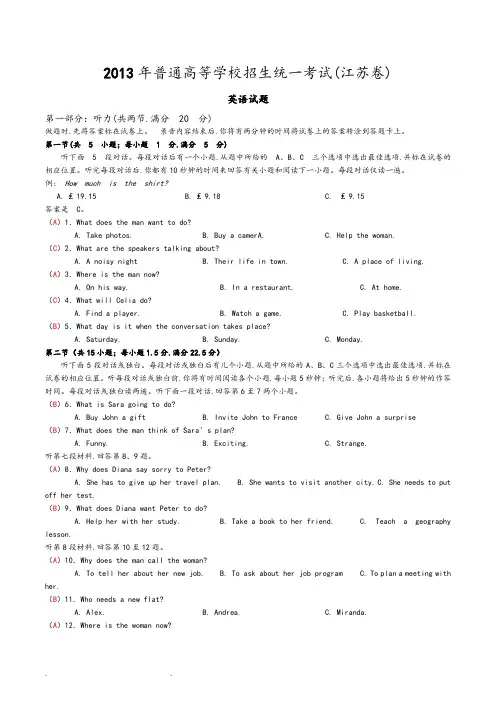
2013年普通高等学校招生统一考试(江苏卷)英语试题第一部分:听力(共两节.满分20 分)做题时.先将答案标在试卷上。
录音内容结束后.你将有两分钟的时间将试卷上的答案转涂到答题卡上。
第一节(共 5 小题;每小题 1 分.满分 5 分)听下面 5 段对话。
每段对话后有一个小题.从题中所给的A、B、C 三个选项中选出最佳选项.并标在试卷的相应位置。
听完每段对话后.你都有10秒钟的时间来回答有关小题和阅读下一小题。
每段对话仅读一遍。
例:How much is the shirt?A. ₤19.15B. ₤9.18C. ₤9.15答案是C。
(A)1.What does the man want to do?A. Take photos.B. Buy a camerA.C. Help the woman.(C)2.What are the speakers talking about?A. A noisy nightB. Their life in town.C. A place of living.(A)3.Where is the man now?A. On his way.B. In a restaurant.C. At home.(C)4.What will Celia do?A. Find a player.B. Watch a game.C. Play basketball.(B)5.What day is it when the conversation takes place?A. Saturday.B. Sunday.C. Monday.第二节(共15小题;每小题1.5分.满分22.5分)听下面5段对话或独白。
每段对话或独白后有几个小题.从题中所给的A、B、C三个选项中选出最佳选项.并标在试卷的相应位置。
听每段对话或独白前.你将有时间阅读各个小题.每小题5秒钟;听完后.各小题将给出5秒钟的作答时间。
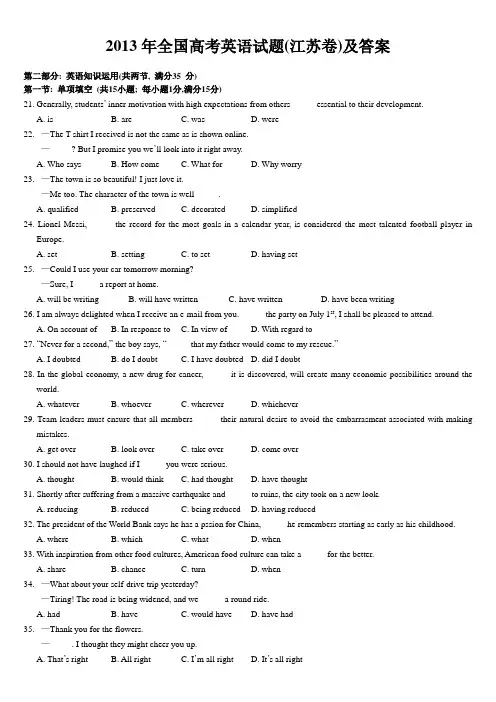
2013年全国高考英语试题(江苏卷)及答案第二部分: 英语知识运用(共两节, 满分35 分)第一节: 单项填空(共15小题; 每小题1分,满分15分)21. Generally, students’ inner motivation with high expectations from others _____ essential to their development.A. isB. areC. wasD. were22. —The T-shirt I received is not the same as is shown online.—_____? But I promise you we’ll look into it right away.A. Who saysB. How comeC. What forD. Why worry23. —The town is so beautiful! I just love it.—Me too. The character of the town is well _____.A. qualifiedB. preservedC. decoratedD. simplified24. Lionel Messi, _____ the record for the most goals in a calendar year, is considered the most talented football player inEurope.A. setB. settingC. to setD. having set25. —Could I use your car tomorrow morning?—Sure, I _____ a report at home.A. will be writingB. will have writtenC. have writtenD. have been writing26. I am always delighted when I receive an e-mail from you. _____ the party on July 1st, I shall be pleased to attend.A. On account ofB. In response toC. In view ofD. With regard to27. “Never for a second,” the boy says, “_____ that my father would come to my rescue.”A. I doubtedB. do I doubtC. I have doubtedD. did I doubt28. In the global economy, a new drug for cancer, _____ it is discovered, will create many economic possibilities around theworld.A. whateverB. whoeverC. whereverD. whichever29. Team leaders must ensure that all members _____ their natural desire to avoid the embarrasment associated with makingmistakes.A. get overB. look overC. take overD. come over30. I should not have laughed if I _____ you were serious.A. thoughtB. would thinkC. had thoughtD. have thought31. Shortly after suffering from a massive earthquake and _____ to ruins, the city took on a new look.A. reducingB. reducedC. being reducedD. having reduced32. The president of the World Bank says he has a pssion for China, _____ he remembers starting as early as his childhood.A. whereB. whichC. whatD. when33. With inspiration from other food cultures, American food culture can take a _____ for the better.A. shareB. chanceC. turnD. when34. —What about your self-drive trip yesterday?—Tiring! The road is being widened, and we _____ a round ride.A. hadB. haveC. would haveD. have had35. —Thank you for the flowers.—_____. I thought they might cheer you up.A. That’s rightB. All rightC. I’m all rightD. It’s all right第二节: 完形填空(共20小题; 每小题1 分, 满分20 分)I used to believe in the American Dream, which meant a job, a mortgage (按揭), credit cards, success. I wanted it and worked toward it like everyone else, all of us 36 chasing the same thing.One year, through a series of unhappy events, it all fell 37 . I found myself homeless and alone. I had my truck and $56. I 38 the countryside for some place I could rent for the 39 possible amount. I came upon a shabby house four miles up a winding mountain road 40 the Potomac River in West Virginia. It was 41 , full of broken glass and rubbish. I found the owner, rented it, and 42 a corner to camp in.The locals knew nothing about me, 43 slowly, they started teaching me the 44 of being a neighbor. They dropped off blankets, candles, and tools, and began 45 around to chat. They started to teach me a belief in a 46 American Dream—not the one of individual achievement but of 47 .What I have believed in, all those things I thought were 48 for a civilized life, were nonexistent in this place. 49 on the mountain, my most valuable possessions were my 50 with my neighbors.Four years later, I moved back into 51 . I saw many people were having a really hard time, 52 their jobs and homes. I managed to rent a big enough house to 53 a handful of people. There are four of us now in the house, but over time I’ve had nine people come in and move on to other places. We’d all be in 54 if we had n’t banded together.The American Dream I believe in now is a shared one. It’s not so much about what I can get for myself; it’s about 55 we can all get by together.36. A. separately B. equally C. violently D. naturally37. A. off B. apart C. over D. out38. A. crossed B. left C. toured D. searched39. A. fullest B. largest C. fairest D. cheapest40. A. at B. through C. over D. round41. A. occupied B. abandoned C. emptied D. robbed42. A. turned B. approached C. cleared D. cut43. A. but B. although C. otherwise D. for44. A. benefit B. lesson C. nature D. art45. A. sticking B. looking C. swingting D. turning46. A. wild B. real C. different D. remote47. A. neighborliness B. happiness C. friendliness D. kindness48. A. unique B. expensive C. rare D. necessary49. A. Up B. Down C. Deep D. Along50. A. cooperation B. relationship C. satisfaction D. appointments51. A. reality B. society C. town D. life52. A. creating B. losing C. quitting D. offering53. A. put in B. turn in C. take in D. get in54. A. yards B. shelters C. camps D. cottages55. A. when B. what C. whether D. how第三部分: 阅读理解(共15 小题; 每小题2 分, 满分30 分)A56. The leaflet is to inform visitors of the Park’s _____.A. advanced managementB. thrill performancesC. entertainment facilitiesD. thoughtful services57. A visitor to the Park can _____.A. rent a stroller outside Front GateB. ask for first aid by Thunder RunC. smoke in the Water ParkD. leave his pet at KidZvilleBWe’ve considered several ways of paying to cut in line: hiring line standers, buying tickets fromscalpers (票贩子), or purchasing line-cutting privileges directly from, say, an airline or anamusement park. Each of these deals replaces the morals of the queue (waiting your turn) with the morals of the market (paying a price for faster service).Markets and queues—paying and waiting—are two different ways of allocating things, and each is appropriate to different activities. The morals of the queue, “First come, first served,” have an egalitarian (平等主义的) appeal. They tell us to ignore privilege, power, and deep pockets.The principle seems right on playgrounds and at bus stops. But the morals of thequeue do not govern all occasions. If I put my house up for sale, I have no duty toaccept the first offer that comes along, simply because it’s the first. Selling myhouse a nd waiting for a bus are different activities, properly governed by different standards.Sometimes standards change, and it is unclear which principle should apply. Think of the recorded message you hear, played over and over, as you wait on hold when calling your bank: “Your call will be answered in the order in which it was received.” This is essential for the moralsof the queue. It’s as if the company is trying to ease our impatience with fairness.But don’t take the recorded message too seriously. Today, some people’s calls are answered faster than others. Call center technology enables companies to “score” incoming calls and to give faster service to those that come from rich places. You might call this telephonic queue jumping.Of course, markets and queues are not the only ways of allocating things. Some goods we distribute by merit, others by need, still others by chance. However, the tendency of markets to replace queues, and other non-market ways of allocating goods is so common in modern life that we scarcely notice it anymore. It is striking that most of the paid queue-jumping schemes we’ve considered — at airports and amusement parks, in call centers, doctors’ offices, and national parks — are recent developments, scarcely imaginable three decades ago. The disappearance of the queues in these places may seem an unusual concern, but these are not the only places that markets have entered.58. According to the author, which of the following seems governed by the principle “First come,first served”?A. Taking buses.B. Buying houses.C. Flying with an airline.D. Visiting amusement parks.59. The example of the recorded message in Paragraphs 4 and 5 illustrates _____.A. the necessity of patience in queuingB. the advantage of modern technologyC. the uncertainty of allocation principleD. the fairness of telephonic services60. The passage is meant to _____.A. justify paying for faster servicesB. discuss the morals of allocating thingsC. analyze the reason for standing in lineD. criticize the behavior of queue jumpingCIf a diver surfaces too quickly, he may suffer the bends. Nitrogen (氮) dissolved (溶解) in his blood is suddenly liberated bythe reduction of pressure. The consequence, if the bubbles (气泡) accumulate in a joint, is sharp pain and a bent body—thus the name. If the bubbles form in his lungs or his brain, the consequence can bedeath.Other air-breathing animals also suffer this decompression (减压) sickness if they surface too fast: whales, for example. And so, long ago, did ichthyosaurs. That these ancient sea animals got the bends can beseen from their bones. If bubbles of nitrogen form inside the bone they can cut off its blood supply. This kills the cells in the bone, and consequently weakens it, sometimes to the point of collapse. Fossil (化石) bones that have caved in on themselves are thus a sign that the animal once had the bends.Bruce Rothschild of the University of Kansas knew all this when he began a study of ichthyosaur bones to find out how widespread the problem was in the past. What he particularly wanted to investigate was how ichthyosaurs adapted to the problem of decompression over the 150 million years. To this end, he and his colleagues traveled the world’s natural-history museums, looking at hundreds of ichthyosaurs from the Triassic period and from the later Jurassic and Cretaceous periods.When he started, he assumed that signs of the bends would be rarer in younger fossils, reflecting their gradual evolution of measures to deal with decompression. Instead, he was astonished to discover the opposite. More than 15% of Jurassic and Cretaceous ichthyosaurs had suffered the bends before they died, but not a single Triassic specimen (标本) showed evidence of that sort of injury.If ichthyosaurs did evolve an anti-decompression means, they clearly did so quickly—and, most strangely, they lost it afterwards. But that is not what Dr Rothschild thinks happened. He suspects it was evolution in other animals that caused the change.Whales that suffer the bends often do so because they have surfaced to escape apredator (捕食动物) such as a large shark. One of the features of Jurassic oceans was an abundance of large sharks and crocodiles, both of which were fond of ichthyosaur lunches. Triassic oceans, by contrast, were mercifully shark- and crocodile-free. In the Triassic, then, ichthyosaurs were top of the food chain. In the Jurassic and Cretaceous, they were prey (猎物) as well as predator—and often had to make a speedy exit as a result.61. Which of the following is a typical symptom of the bends?A. A twisted body.B. A gradual decrease in blood supply.C. A sudden release of nitrogen in blood.D. A drop in blood pressure.62. The purpose of Rothschild’s study is to see _____.A. how often ichthyosaurs caught the bendsB. how ichthyosaurs adapted to decompressionC. why ichthyosaurs bent their bodiesD. when ichthyosaurs broke their bones63. Rothschild’s finding stated in Paragraph 4 _____.A. confirmed his assumptionB. speeded up his research processC. disagreed with his assumptionD. changed his research objectives64. Rothschild might have concluded that ichthyosaurs ______.A. failed to evolve an anti-decompression meansB. gradually developed measures against the bendsC. died out because of large sharks and crocodilesD. evolved an anti-decompression means but soon lost itDMark Twain has been called the inventor of the American novel. And he surely deserves additional praise: the man who popularized the clever literary attack on racism.I say clever because anti-slavery fiction had been the important part of theliterature in the years before the Civil War. H. B. Stowe’s Uncle Tom’s Cabin is only the most famous example. These early stories dealt directly with slavery. With minor exceptions, Twain planted his attacks on slavery and prejudice into tales that were on the surface about something else entirely. He drew his readers into the argument by drawing them into the story.Again and again, in the postwar years, Twain seemed forced to deal with the challenge of race. Consider the most controversial, at least today, of Twain’s novels, Adventures of Huckleberry Finn. Only a few books have been kicked off the shelves as often as Huckleberry Finn, Twains most widely read tale. Once upon a time, people hated the book because it struck them as rude. Twain himself wrote that those who banned the book considered the novel “trash and suitable only for the slums (贫民窟).” More recently the book has been attacked because of the character Jim, the escaped slave, and many occurences of the word nigger. (The term Nigger Jim, for which the novel is often severely criticized, never appears in it.) But the attacks were and are silly—and miss the point. The novel is strongly anti-slavery. Jim’s search through the slave states for the family from whom he has been forcibly parted is heroic. As J. Chadwick has pointed out, the character of Jim was a first in American fiction—a recognition that the slave had two personalities, “the voice of survival within a white slave culture and the voice of the individual: Jim, the father and the man.”There is much more. Twain’s mystery novel Pudd’nhead Wilson stood as a challenge to the racial beliefs of even many of the liberals of his day. Written at a time when the accepted wisdom held Negroes to be inferior (低等的) to whites, especially in intelligence, Twain’s tale centered in part around two babies switched at birth. A slave gave birth to her master’s baby and, for fear that the child should be sold South, switched him for the master’s baby by his wife. The slave’s light-skinned child was taken to be white and grew up with both the attitudes and the education of the slave-holding class. The master’s wife’s baby was taken for black and grew up with the attitudes and intonations of the slave.The point was difficult to miss: nurture (养育), not nature, was the key to social status. The features of the black man that provided the stuff of prejudice—manner of speech, for example—were, to Twain, indicative of nothing other than the conditioning that slavery forced on its victims.Twain’s racial tone was not perfect. One is left uneasy, for example, by the lengthy passage in his autobiography (自传) about how m uch he loved what were called “nigger shows”in his youth—mostly with white men performing in black-face—and his delight in getting his mother to laugh at them. Yet there is no reason to think Twain saw the shows as representing reality. His frequent attacks on slavery and prejudice suggest his keen awareness that they did not.Was Twain a racist? Asking the question in the 21st century is as wise as asking the same of Lincoln. If we read the words and attitudes of the pas t through the “wisdom”of the considered moral judgments of the present, we will find nothing but error. Lincoln, who believed the black manthe inferior of the white, fought and won a war to free him. And Twain, raised in a slave state, briefly a soldier, and inventor of Jim, may have done more to anger the nation over racial injustice and awaken its collective conscience than any other novelist in the past century.65. How do Twain’s novels on slavery differ from Stowe’s?A. Twain was more willing to deal with racism.B. Twain’s attack on racism was much less open.C. Twain’s themes seemed to agree with plots.D. Twain was openly concerned with racism.66. Recent criticism of Adventures of Huckleberry Finn arose partly from its _____.A. target readers at the bottomB. anti-slavery attitudeC. rather impolite languageD. frequent use of “nigger”67. What best proves Twain’s anti-slavery stand according to the author?A. Jim’s search for his family was described in detail.B. The slave’s voice was first heard in American novels.C. Jim grew up into a man and a father in the white culture.D. Twain suspected that the slaves were less intelligent.68. The story of two babies switched mainly indicates that _____.A. slaves were forced to give up their babies to their mastersB. slaves’ babies could pick up slave-holders’ way of speakingC. blacks’ social position was shaped by how they were brought upD. blacks were born with certain features of prejudice69. What does the underlined word “they” in Paragraph 7 refer to?A. The attacks.B. Slavery and prejudice.C. White men.D. The shows.70. What does the author mainly argue for?A. Twain had done more than his contemporary writers to attack racism.B. Twain was an admirable figure comparable to Abraham Lincoln.C. Twain’s works had been banned on unreasonable grounds.D. Twain’s works should be read from a historical point of view.第四部分: 任务型阅读(共10 小题;每小题1 分,满分10 分)请认真阅读下列短文,并根据所读内容在文章后表格中的空格里填入一个..最恰当的单词。
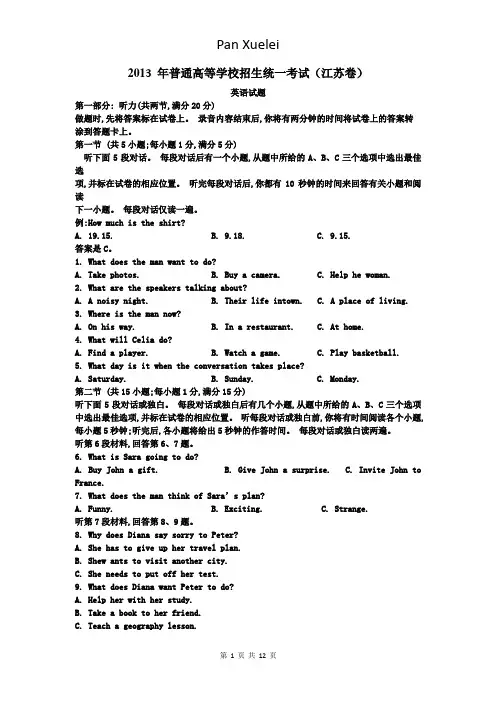
2013年普通高等学校招生统一考试(江苏卷)英语试题第一部分: 听力(共两节,满分20分)做题时,先将答案标在试卷上。
录音内容结束后,你将有两分钟的时间将试卷上的答案转涂到答题卡上。
第一节 (共5小题;每小题1分,满分5分)听下面5段对话。
每段对话后有一个小题,从题中所给的A、B、C三个选项中选出最佳选项,并标在试卷的相应位置。
听完每段对话后,你都有10秒钟的时间来回答有关小题和阅读下一小题。
每段对话仅读一遍。
例:How much is the shirt?A. 19.15.B. 9.18.C. 9.15.答案是C。
1. What does the man want to do?A. Take photos.B. Buy a camera.C. Help he woman.2. What are the speakers talking about?A. A noisy night.B. Their life intown.C. A place of living.3. Where is the man now?A. On his way.B. In a restaurant.C. At home.4. What will Celia do?A. Find a player.B. Watch a game.C. Play basketball.5. What day is it when the conversation takes place?A. Saturday.B. Sunday.C. Monday.第二节 (共15小题;每小题1分,满分15分)听下面5段对话或独白。
每段对话或独白后有几个小题,从题中所给的A、B、C三个选项中选出最佳选项,并标在试卷的相应位置。
听每段对话或独白前,你将有时间阅读各个小题,每小题5秒钟;听完后,各小题将给出5秒钟的作答时间。
每段对话或独白读两遍。
听第6段材料,回答第6、7题。
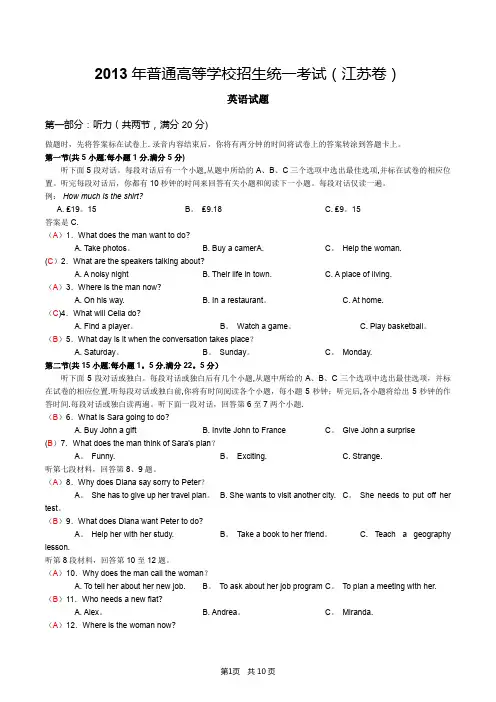
2013年普通高等学校招生统一考试(江苏卷)英语试题第一部分:听力(共两节,满分20分)做题时,先将答案标在试卷上.录音内容结束后,你将有两分钟的时间将试卷上的答案转涂到答题卡上。
第一节(共5小题;每小题1分,满分5分)听下面5段对话。
每段对话后有一个小题,从题中所给的A、B、C三个选项中选出最佳选项,并标在试卷的相应位置。
听完每段对话后,你都有10秒钟的时间来回答有关小题和阅读下一小题。
每段对话仅读一遍。
例:How much is the shirt?A. ₤19。
15B。
₤9.18 C.₤9。
15答案是C.(A)1.What does the man want to do?A. Take photos。
B. Buy a camerA. C。
Help the woman.(C)2.What are the speakers talking about?A. A noisy nightB. Their life in town.C. A place of living.(A)3.Where is the man now?A. On his way.B. In a restaurant。
C. At home.(C)4.What will Celia do?A. Find a player。
B。
Watch a game。
C. Play basketball。
(B)5.What day is it when the conversation takes place?A. Saturday。
B。
Sunday。
C。
Monday.第二节(共15小题;每小题1。
5分,满分22。
5分)听下面5段对话或独白。
每段对话或独白后有几个小题,从题中所给的A、B、C三个选项中选出最佳选项,并标在试卷的相应位置.听每段对话或独白前,你将有时间阅读各个小题,每小题5秒钟;听完后,各小题将给出5秒钟的作答时间.每段对话或独白读两遍。
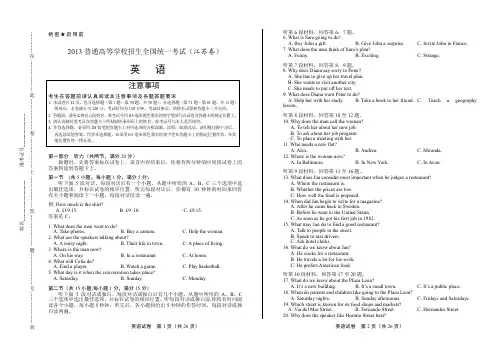
英语试卷 第1页(共26页)英语试卷 第2页(共26页)绝密★启用前2013普通高等学校招生全国统一考试(江苏卷)英语注意事项考生在答题前请认真阅读本注意事项及各题答题要求1. 本试卷共12页,包含选择题(第1题~第70题,共70题)、非选择题(第71题~第81题,共11题)两部分。
本卷满分为120分,考试时间为120分钟。
考试结束后,请将本试卷和答题卡一并交回。
2. 答题前,请务必将自己的姓名、准考证号用0.5毫米黑色墨水的签字笔填写在试卷及答题卡的规定位置上。
3. 请认真核对监考员在答题卡上所粘贴的条形码上的姓名、准考证号与本人是否相符。
4. 作答选择题,必须用2B 铅笔把答题卡上对应选项的方框涂满、涂黑;如需改动,请用橡皮擦干净后,再选涂其他答案。
作答非选择题,必须用0.5毫米黑色墨水的签字笔在答题卡上的指定位置作答,在其他位置作答一律无效。
第一部分 听力(共两节,满分20分)做题时,先将答案标在试卷上。
录音内容结束后,你将有两分钟的时间将试卷上的答案转涂到答题卡上。
第一节 (共5小题;每小题1分,满分5分)听下面5段对话。
每段对话后有一个小题,从题中所给的A 、B 、C 三个选项中选出最佳选项,并标在试卷的相应位置。
听完每段对话后,你都有10秒钟的时间来回答有关小题和阅读下一小题。
每段对话仅读一遍。
例: How much is the shirt? A. £19.15. B. £9. 18.C. £9.15.答案是C 。
1. What does the man want to do?A. Take photos.B. Buy a camera.C. Help the woman. 2. What are the speakers talking about? A. A noisy night. B. Their life in town. C. A place of living. 3. Where is the man now? A. On his way. B. In a restaurant. C. At home. 4. What will Celia do? A. Find a player. B. Watch a game. C. Play basketball. 5. What day is it when the conversation takes place? A. Saturday. B. Sunday.C. Monday.第二节(共15小题;每小题1分,满分15分)听下面5段对话或独白。
2013年普通高等学校招生全国统一考试英语试题(江苏卷)第一部分: 听力(共两节,满分20分)第一节(共5小题;每小题1分,满分5分)听下面5段对话。
每段对话仅读一遍。
1. What does the man want to do ?A. Take photos .B. Buy a camera .C. Help the woman.2. What are the speakers talking about ?A. A noisy night .B. Their life in town .C. A place of living.3. Where is the man now ?A. On his way.B. In a restaurant .C. At home.4. What will Celia do ?A. Find a player .B. Watch a game.C. Play basketball .5. What day is it when the conversation takes place?A. Saturday.B. Sunday.C. Monday.第二节(共15小题;每小题1分,满分15分)听下面5段对话或独白。
每段对话或独白读两遍。
听第6段材料,回答第6、7题。
6. What is Sara going to do ?A. Buy John a gift .B. Give John a surprise .C. Invite John to France .7. What does the man think of Sara’s plan?A. Funny.B. Exciting.C. Strange.听第7段材料,回答第8、9题。
8. Why does Diana say sorry to Peter ?A. She has to give up her travel plan.B. She wants to visit another city.C. She needs to put off her test.9. What does Diana want Peter to do?A. Help her with her study.B. Take a book to her friend.C. Teach a geography lesson.听第8段材料,回答第10至12题。
2013年全国高考英语试题(江苏卷)及答案第一部分:听力(共两节,满分30分)该部分分为第一、第二两节。
注意:回答听力部分时,请先将答案标在试卷上。
听力部分结束时,你将有两分钟的时间将你的答案转涂到客观题答题卡上。
第一节(共5小题;每小题1.5分,满分7.5分)听下面5段对话。
每段对话后有一个小题,从题中所给的A、B、C三个选项中选出最佳选项,并标在试卷的相应位置。
听完每段对话后,你都有10秒钟的时间来回答有关小题和阅读下一小题。
每段对话仅读一遍。
例:How much is the shirt?A. £19.15B. £9.18C. £9.15答案是C。
1. What does the man want to do?A. Take photos.B. Buy a camera.C. Help the woman.2. What are the speakers talking about?A. A noisy nightB. Their life in town.C. A place of living.3. Where is the man now?A. On his way.B. In a restaurant.C. At home.4. What will Celia do?A. Find a player.B. Watch a game.C. Play basketball.5. What day is it when the conversation takes place?A. Saturday.B. Sunday.C. Monday.第二节(共15小题;每小题1.5分,满分22.5分)听下面5段对话或独白。
每段对话或独白后有几个小题,从题中所给的A、B、C三个选项中选出最佳选项,并标在试卷的相应位置。
听每段对话或独白前,你将有时间阅读各个小题,每小题5秒钟;听完后,各小题将给出5秒钟的作答时间。
2013江苏高考英语试题第一部分: 听力(共两节,满分20分)做题时,先将答案标在试卷上。
录音内容结束后,你将有两分钟的时间将试卷上的答案转涂到答题卡上。
第一节 (共5小题;每小题1分,满分5分)听下面5段对话。
每段对话后有一个小题,从题中所给的A、B、C三个选项中选出最佳选项,并标在试卷的相应位置。
听完每段对话后,你都有10秒钟的时间来回答有关小题和阅读下一小题。
每段对话仅读一遍。
例:How much is the shirt ?A. £19.15.B. £9.18.C. £ 9.15.答案是C。
1. What does the man want to do ?A. Take photos .B. Buy a camera .C. Help the woman.2. What are the speakers talking about ?A. A noisy night .B. Their life in town .C. A place of living.3. Where is the man now ?A. On his way.B. In a restaurant .C. At home.4. What will Celia do ?A. Find a player .B. Watch a game.C. Play basketball .5. What day is it when the conversation takes place?A. Saturday.B. Sunday.C. Monday.第二节 (共15小题;每小题1分,满分15分)听下面5段对话或独白。
每段对话或独白后有几个小题,从题中所给的A、B、C三个选项中选出最佳选项,并标在试卷的相应位置。
听每段对话或独白前,你将有时间阅读各个小题,每小题5秒钟;听完后,各小题将给出5秒钟的作答时间。
每段对话或独白读两遍。
听第6段材料,回答第6、7题。
2013年普通高等学校招生全国统一考试(江苏卷)英语第I卷第一部分:听力(共两节,满分30分)第一节(共5小题;每小题1。
5分,满分7.5分)听下面5段对话。
每段对话后有一个小题,从题中所给的A、B、C三个选项中选出最佳选项,并标在试卷的相应位置。
听完每段对话后,你都有10秒钟的时间来回答有关小题和阅读下一小题。
每段对话仅读一遍。
例:How much is the shirt?A.£19.15。
B。
£9.18。
C。
£9。
15。
答案是C.1. What does the man want to do?A. Take photos. B。
Buy a camera. C. Help the woman。
2。
What are the speakers talking about?A. A noisy night.B. Their life in town。
C. A place of living.3. Where is the man now?A。
On his way. B。
In a restaurant。
C. At home.4. What will Celia do?A. Find a player。
B. Watch a game。
C。
Play basketball.5。
What day is it when the conversation takes place?A。
Saturday. B。
Sunday. C. Monday。
第二节(共15小题;每小题1.5分,满分22.5分)听下面5段对话或独白.每段对话或独白后有几个小题,从题中所给的A、B、C三个选项中选出最佳选项,并标在试卷的相应位置.听每段对话或独白前,你将有时间阅读各个小题,每小题5秒钟;听完后,各小题将给出5秒钟的作答时间.每段对话或独白读两遍。
听下面一段对话,回答第6至7两个小题。
6。
What is Sara going to do?A。
2013年普通高等学校招生统一考试(江苏卷)英语试题第一部分:听力(共两节,满分 20 分)做题时,先将答案标在试卷上。
录音内容结束后,你将有两分钟的时间将试卷上的答案转涂到答题卡上。
第一节(共 5 小题;每小题 1 分,满分 5 分)听下面 5 段对话。
每段对话后有一个小题,从题中所给的 A、B、C 三个选项中选出最佳选项,并标在试卷的相应位置。
听完每段对话后,你都有10秒钟的时间来回答有关小题和阅读下一小题。
每段对话仅读一遍。
例: How much is the shirt?A. ?19.15B. ?9.18C. ?9.15答案是 C。
(A)1.What does the man want to do?A. Take photos.B. Buy a camerA.C. Help the woman.(C)2.What are the speakers talking about?A. A noisy nightB. Their life in town.C. A place of living.(A)3.Where is the man now?A. On his way.B. In a restaurant.C. At home.(C)4.What will Celia do?A. Find a player.B. Watch a game.C. Play basketball.(B)5.What day is it when the conversation takes place?A. Saturday.B. Sunday.C. Monday.第二节(共15小题;每小题 1.5分,满分22.5分)听下面5段对话或独白。
每段对话或独白后有几个小题,从题中所给的A、B、C三个选项中选出最佳选项,并标在试卷的相应位置。
听每段对话或独白前,你将有时间阅读各个小题,每小题5秒钟;听完后,各小题将给出5秒钟的作答时间。
2013年普通高等学校招生全国统一考试(江苏卷)英语第一部分:听力(略)第二部分:英语知识运用(共两节,满分35分)第一节:单项填空(共15小题;每小题1分,满分15分)请认真阅读下面各题,从题中所给的A、B、C、D四个选项中,选出最佳选项。
例:It is generally considered unwise to give a child ______ he or she wants.A. howeverB. whateverC. whicheverD. whenever答案是B。
21.Generally, students’ inner motivation wit h high expectations from others______ essential to their development.A. isB. areC. wasD. were解析:句意:一般认为,其他人对学生高的期望是他们发展的必要的内部动机对。
本句主语是“motivation”,所以谓语动词用单数,而且是一般情况所以用一般现在时。
答案:A22. —The T-shirt I received is not the same as is shown online.—______? But I promise you we’ll look into it right away.A. Who saysB. How comeC. What forD. Why worry解析:Who says?谁说的?;“How come”怎么会呢?;“What for”为了什么?;“Why worry”为何忧伤;因何烦恼,例:Why Worry About This为什么担心这些?答案:B23. —The town is so beautiful! I just love it.—Me too. The character of the town is well ______.A. qualifiedB. preservedC. decoratedD. simplified解析:句意:这个城镇的特征保存很好。
2013年普通高等学校招生全国统一考试(江苏卷)英语试题第一部分: 听力(共两节,满分20分)做题时,先将答案标在试卷上。
录音内容结束后,你将有两分钟的时间将试卷上的答案转涂到答题卡上。
第一节(共5小题;每小题1分,满分5分)听下面5段对话。
每段对话后有一个小题,从题中所给的A、B、C三个选项中选出最佳选项,并标在试卷的相应位置。
听完每段对话后,你都有10秒钟的时间来回答有关小题和阅读下一小题。
每段对话仅读一遍。
例:How much is the shirt ?A. £19.15.B. £9.18.C. £9.15.答案是C。
1. What does the man want to do?A. Take photos.B. Buy a camera.C. Help the woman.2. What are the speakers talking about?A. A noisy night.B. Their life in town.C. A place of living.3. Where is the man now?A. On his way.B. In a restaurant.C. At home.4. What will Celia do?A. Find a player.B. Watch a game.C. Play basketball.5. What day is it when the conversation takes place?A. Saturday.B. Sunday.C. Monday.第二节(共15小题;每小题1分,满分15分)听下面5段对话或独白。
每段对话或独白后有几个小题,从题中所给的A、B、C三个选项中选出最佳选项,并标在试卷的相应位置。
听每段对话或独白前,你将有时间阅读各个小题,每小题5秒钟;听完后,各小题将给出5秒钟的作答时间。
每段对话或独白读两遍。
听第6段材料,回答第6、7题。
6. What is Sara going to do?A. Buy John a gift.B. Give John a surprise.C. Invite John to France.7. What does the man think of S ara’s plan?A. Funny.B. Exciting.C. Strange.听第7段材料,回答第8、9题。
8. Why does Diana say sorry to Peter?A. She has to give up her travel plan.B. She wants to visit another city.C. She needs to put off her test.9. What does Diana want Peter to do?A. Help her with her study.B. Take a book to her friend.C. Teach a geography lesson.听第8段材料,回答第10至12题。
10. Why does the man call the woman?A. To tell her about her new job.B. To ask about her job program.C. To plan a meeting with her.11. Who needs a new flat?A. Alex.B. Andrea.C. Miranda.12. Where is the woman now?A. In Baltimore.B. In New York.C. In Avon.听第9段材料,回答第13至16题。
13. What does Jan consider most important when he judges a restaurant?A. Where the restaurant is.B. Whether the prices are low.C. How well the food is prepared.14. When did Jan begin to write for a magazine ?A. After he came back to Sweden.B. Before he went to the United States.C. As soon as he got find a good restaurant?15. What may Jan do to find a good restaurant?A. Talk to people in the street.B. Speak to taxi drivers.C. Ask hotel clerks.16. What do we know about Jan?A. He cooks for a restaurant.B. He travels a lot for his work.C. He prefers American food.听第10段材料,回答第17至20题。
17. What do we know about the Plaza Leon?A. It’s a new building. B, It’s a small town. C. It’s a public place.18. When do Parents and children like going to the Plaza Leon?A. Saturday nights.B. Sunday afternoons.C. Fridays and Saturdays.19. Why does the speaker like Horatio Street best?A. Via del Mar Street .B. Fernmando Street.C. Hermandes Street.20. Why does the Speaker like Horatio Street best ?A. It has an old stone surface.B. It is named after a writer.C. It has famous university.第二部分:英语知识运用(共两节,满分35分)第一节:单项填空(共15小题;每小题1分,满分15分)请认真阅读下面各题,从题中所给的A、B、C、D四个选项中,选出最佳选项,并在答题卡上将该项涂黑。
例:It is generally considered unwise to give a child _______ he or she wants.A. howeverB. whateverC. whicheverD. whenever答案是B。
21. Generally, students’ inner motivation with high expectations from others _______ essential to their development.A. isB. areC. wasD. were22. —The T-shirt I received is not the same as is shown online.—_______? But I promise you we’ll look into it right away.A. Who saysB. How comeC. What forD. Why worry23. —The town is so beautiful! I just love it.—Me too. The character of the town is well_______.A. qualifiedB. preservedC. decoratedD. simplified24. Lionel Messi _______ the record for the most goals in a calendar year, is considered the most talented football player in Europe.A. setB. settingC. to setD. having set25. —Could I use your car tomorrow morning?—Sure. I_______ are port at home.A. will be writingB. will have writtenC. have writtenD. have been writing26. I am always delighted when I receive an email from you. _______ the party on July 1st , I shall be pleased to attend .A. On account ofB. In response toC. In view ofD. With regard to27. “Never for a second,” the boy says, “ _______ that my father would come to my rescue.”A. I doubted B . do I doubt C. I have doubted D. did I doubt28. In the global economy, a new drug for cancer, _______ it is discovered, will create many economic possibilities around the world.A. whateverB. whoeverC. whereverD. whichever29. Team leaders must ensure that all members_______ their natural desire to avoid the embarrassment associated with making mistakes.A. get overB. look overC. takeoverD. come over30. I should not have laughed if I_______ you were serious.A. thoughtB. would thinkC. had thoughtD. have thought31. Shortly after suffering from a massive earthquake and _______ to ruins, the city took on a new look.A. reducingB. reducedC. being reducedD. having reduced32. The president of the World Bank says he has a passion for China_______ , he remembers starting as early as his childhood.A. whereB. whichC. whatD. when33. With inspiration from other food cultures, American food culture can take a ______ for the better.A. shareB. chanceC. turnD. lead34. —What about your self-drive trip yesterday?—Tiring! The road is being widened, and we _______ a rough ride.A. hadB. haveC. would haveD. have had35. —Thank you for the flowers.—_______ . I thought they might cheer you up.A. That’s rightB. All rightC. I mall rightD. It’s all right第二节: 完形填空(共20 小题; 每小题1 分, 满分20 分)请认真阅读下面短文, 从短文后各题所给的A、B、C、D 四个选项中, 选出最佳选项, 并在答题卡上将该项涂黑。